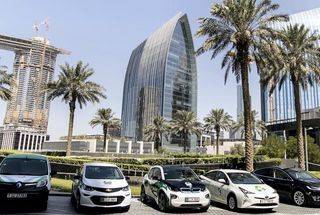Hotel Fleet Vehicles: Principal Considerations

The most effective way to make your hotel fleet more efficient is to update old, uneconomical and unreliable vehicles to newer models. New vehicles can also prove less vulnerable to theft, and at the same time increase road safety. On the other hand, choosing the right vehicles for your hospitality business is often a matter of logistic that revolves around use, distances, type of cargo, fuel economy and financing options. Consider these points as you create a detailed outline of your future fleet.
Current fleet shortcomings
The best place to start when considering a new car or van for your hotel is the performance issues you have been experiencing with the current choice. For example, it can be the worsening fuel efficiency that's increased the running costs. In this case, a solution might be choosing a model with an alternative fuel or one with a high-efficiency fuel to mileage ratio. Not only are you eliminating the source of overspending, but increasing the entire fleet's net efficiency with a single purchase.
Evaluate custom specifications
No one knows the requirements of your vehicle fleet better than yourself, so make sure you deploy that expertise when selecting replacement vehicles for your hotel. Once you've settled with a model that outperforms the one you're looking to replace, think about how custom specifications could make your new truck, car or utility vehicle even more valuable in the long term. Aerodynamic enhancements, for example, can make a big impact on vehicles that spend a lot of time on open highways, such as VIP courtesy cars, shuttling passengers to and from the airport.
Upgrades that save on maintenance
Another reason for customising vehicle specification is that those upgrades can eliminate a host of repair problems before they occur. For example, if not maintained properly, a transmission running at its maximum horsepower can overheat, unless you tune your new vehicle with additional cooling accessories or an automatic transmission. While this might sound as an extra investment at first, consider that your vehicle is less likely to spend extra time down at the repair shop.
Insurance package
It goes without saying that your hotel fleet vehicles must be insured against damage, accidents, and thefts, but in many cases, different types of vehicles require different insurance packages. Some of these extra points accumulate easily on your expense sheet, especially since you're operating a fleet. Luckily, there are always ways to save more on car insurance by choosing an insurer who offers additional markdowns for owners who, for example, park in a secure garage at night, have no demerit points, or haven't had claims in the past three years.
Vehicle use
Another important consideration when planning your hotel fleet is how each of the vehicles will be used on a daily basis. Questions like how many passengers will it carry and what cargo will it haul can help you select the option with the greatest flexibility. As far as the passenger vehicles are concerned, it's often tempting to buy an option that covers all the circumstances, but getting one that satisfies regular business needs is more cost-effective. If you mainly need a cargo vehicle for making supply runs, instead of a full-size truck, consider a fleet of smaller vans or LDVs.
Operating specs
If you can outline how your vehicles are going to be used, you can make better choices on their performance specifications, with features like engine size and fuel efficiency becoming more or less important depending on these. If your vehicles are regularly required to drive off-road, for example, making runs in the country for organically-produced food, their operating specifications might differ from those which spend most of their time in the urban environment. At the same time, hybrid vehicles might provide big cost cuts in the city, but won't be as effective if travelling longer distances.
Don't skip the test drive
When talking about vehicles for your hospitality business, giving them a test drive before purchase is not a question but a necessity. Your feedback will be even more valuable if your hotel drivers are allowed to accompany you. Getting them behind the wheel gives you first-hand details about the vehicle performance from the actual people who'll be driving them. Test drives become even more essential if you decide to choose your fleet from a pool of used vehicles in order to curb your investment. Failing to test and inspect these can breed some nasty surprises once your drivers hit the road.
Making the most of your hotel fleet boils down to selecting the right vehicles. This choice affects everything from fuel costs and repair cycles to driver safety. While it might be tempting to think about the cost first and the function later, purchasing a cheaper vehicle not suited for its job might lower the price point, but will probably cost more down the road.